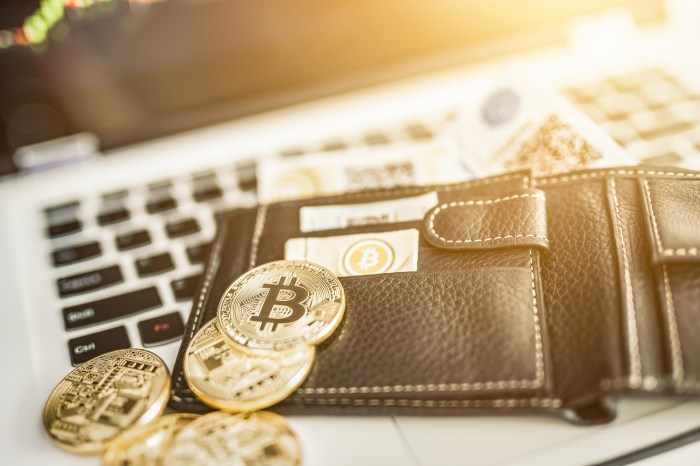Bitcoin wallets, where your digital wealth resides. From hardware to software, learn how to keep your crypto secure and accessible.
Exploring the different types, security measures, and management tips for your Bitcoin wallets. Let’s dive in!
What are Bitcoin wallets?

Bitcoin wallets are digital tools that allow users to store, send, and receive their Bitcoin cryptocurrency. These wallets function similarly to a traditional wallet, but instead of holding physical cash or cards, they store private keys that give access to the Bitcoin stored on the blockchain.
Types of Bitcoin wallets
- Hardware Wallets: These are physical devices that store the user’s private keys offline, providing an extra layer of security against hackers.
- Software Wallets: These are applications or programs that can be installed on computers or mobile devices to manage Bitcoin transactions.
- Paper Wallets: This is a physical document that contains the user’s private and public keys printed on paper, offering a secure way to store Bitcoin offline.
- Online Wallets: These are web-based wallets that allow users to access their Bitcoin through a browser, offering convenience but with potential security risks.
Secure storage for Bitcoin wallets
It is crucial to keep your Bitcoin wallet secure to prevent theft or unauthorized access. This includes using strong passwords, enabling two-factor authentication, and considering cold storage options like hardware or paper wallets.
Key features of a reliable Bitcoin wallet
- Security: A reliable Bitcoin wallet should prioritize security features to protect the user’s funds.
- User-Friendly Interface: The wallet should be easy to use, even for beginners, with clear instructions for transactions.
- Backup and Recovery Options: It is essential to have backup and recovery options in case of loss or damage to the wallet.
- Compatibility: The wallet should be compatible with different operating systems and devices for flexibility in managing Bitcoin.
Types of Bitcoin wallets
Bitcoin wallets come in various forms, each offering unique features and security measures to cater to different user needs. Let’s explore the different types of Bitcoin wallets available in the market.
Hardware wallets vs. Software wallets
Hardware wallets are physical devices that store your private keys offline, providing an extra layer of security against cyber attacks. On the other hand, software wallets are digital applications or platforms that store your private keys online or on your device.
- Hardware Wallets: Examples include Ledger Nano S, Trezor, and KeepKey. They are considered more secure as they are not connected to the internet, reducing the risk of hacking.
- Software Wallets: Examples include Electrum, Exodus, and Mycelium. They are convenient for everyday transactions but may be more vulnerable to cyber threats.
Hot wallets vs. Cold wallets
Hot wallets are connected to the internet, making them suitable for frequent transactions but more susceptible to hacking. Cold wallets, on the other hand, store private keys offline, providing enhanced security but less convenience for regular use.
- Hot Wallets: Examples include online wallets, mobile wallets, and desktop wallets. They are ideal for quick access to funds but may pose a higher risk of theft.
- Cold Wallets: Examples include hardware wallets and paper wallets. They offer better protection against cyber attacks but are less convenient for regular transactions.
Custodial vs. Non-custodial wallets
Custodial wallets are managed and secured by a third party, such as an exchange or wallet provider, who holds your private keys. Non-custodial wallets, on the other hand, give you full control over your private keys and funds.
- Custodial Wallets: Examples include Coinbase, Binance, and Kraken. They provide convenience and support services but require trust in the custodian to safeguard your assets.
- Non-custodial Wallets: Examples include Atomic Wallet, Trust Wallet, and Blockchain Wallet. They offer more control and privacy but require users to take responsibility for their security measures.
Security measures

When it comes to Bitcoin wallets, security is of utmost importance. Protecting your digital assets from hackers and scammers should be a top priority to ensure the safety of your funds.
Private keys and seed phrases play a crucial role in securing your Bitcoin wallet. Your private key is essentially the password that allows you to access and manage your funds. It should be kept confidential and never shared with anyone. On the other hand, your seed phrase is a series of words that can be used to restore access to your wallet in case your device is lost or damaged. It is essential to store your seed phrase in a safe and secure location, away from prying eyes.
Multi-signature wallets
Using a multi-signature wallet can significantly enhance the security of your Bitcoin holdings. This type of wallet requires multiple private keys to authorize a transaction, adding an extra layer of protection. For example, a 2-of-3 multi-signature wallet would require two out of three private keys to approve a transaction. This feature can prevent unauthorized access to your funds and reduce the risk of theft.
- Multi-signature wallets require multiple private keys to authorize transactions.
- They add an extra layer of security to protect your funds.
- They can prevent unauthorized access and reduce the risk of theft.
Remember, always keep your private keys and seed phrase secure to protect your Bitcoin wallet from potential threats.
Common security risks
There are several security risks associated with Bitcoin wallets that users should be aware of. These risks include phishing attacks, malware, and hacking attempts. Phishing attacks involve tricking users into revealing their private keys or seed phrases through fake websites or emails. Malware can infect devices and steal sensitive information, while hackers may attempt to gain unauthorized access to wallets through various means.
- Phishing attacks can lead to the disclosure of private keys or seed phrases.
- Malware can compromise the security of your wallet and steal sensitive information.
- Hackers may try to gain unauthorized access to your funds through various methods.
Accessing and managing Bitcoin wallets
Setting up and managing a Bitcoin wallet is essential for securely storing and using your cryptocurrency. Here’s how you can get started:
Setting up a Bitcoin wallet
- Choose a reputable wallet provider or software that suits your needs (e.g., hardware wallet, desktop wallet, mobile wallet).
- Download and install the wallet application on your device.
- Follow the instructions to create a new wallet, including setting up a strong password or passphrase.
- Generate a unique wallet address to receive Bitcoin.
Sending and receiving Bitcoin, Bitcoin wallets
- To send Bitcoin, enter the recipient’s wallet address and the amount you want to send in your wallet application.
- Confirm the transaction details and authorize the transfer by entering your password or passphrase.
- To receive Bitcoin, share your wallet address with the sender and wait for the funds to arrive in your wallet.
- Always double-check the recipient’s address before sending Bitcoin to avoid any mistakes.
Backing up and restoring a Bitcoin wallet
- Regularly backup your wallet’s private key or seed phrase in a secure location, such as a hardware wallet or encrypted USB drive.
- In case your wallet is lost or damaged, you can restore access to your funds using the backup key or seed phrase.
- Follow the wallet provider’s instructions on how to restore your wallet using the backup key or seed phrase.
Managing multiple Bitcoin wallets
- Consider using different wallets for different purposes, such as one for everyday transactions and another for long-term storage.
- Label each wallet with a specific purpose to keep track of your funds more efficiently.
- Keep your wallets organized and secure by using strong passwords and enabling two-factor authentication where possible.
